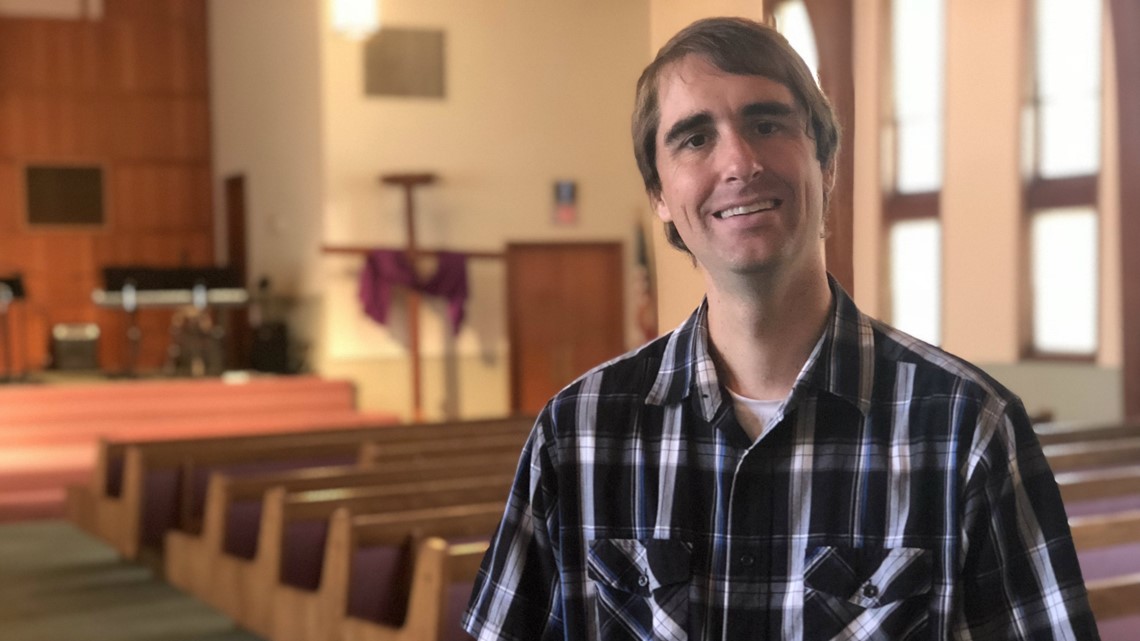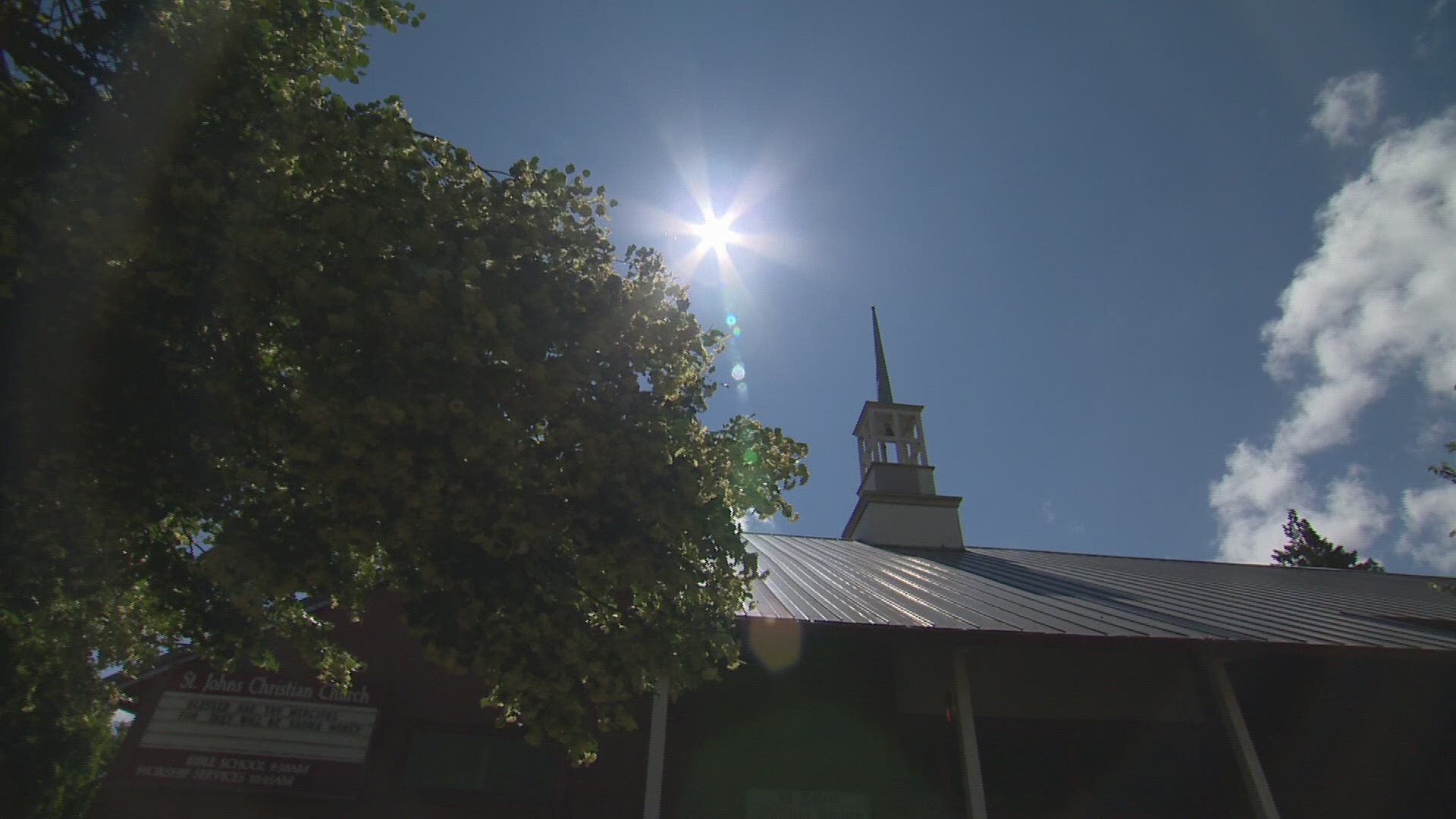Plans put on hold
Months after the first headlines surfaced and weeks after neighbors angrily pushed back against the proposed plans, offers for two Portland-area churches to host homeless campers on their properties still stand.
That said, they’ve both stalled.
“The press coverage and the outpouring early on was because people thought everything was finalized,” said David Libby, senior pastor at St. Johns Christian Church.
Libby stood on the empty lot across from the church, where, back in March, congregates voted to lease to Multnomah County for an amount yet to be decided.
The pitch was to build a more organized and better run replacement for Hazelnut Grove, an embattled self-run homeless camp near North Interstate and Greeley.
It would look and be run like the Kenton Women’s Village, said County officials.
At a packed public meeting in April, neighbors angrily objected, theorizing any village would become a magnet for unauthorized campers and crime.
“They're going to put this next to a Montessori school with four-year-olds. It's mind blowing to me,” said one man.
“How many people think it's a poor location?! Thank you!” yelled another.
Neighbors' fears were seemingly confirmed weeks later when county officials said a group of campers moved their tents and belongings into the lot.
Eventually, they heeded the church’s and county’s orders to move.
A month later, the lot remains empty.
Libby said the hype has quieted some, and the hopeful opening date has been postponed from fall 2019 to the summer of 2020.
The change, which he blamed on factors unrelated to neighborhood pushback, is not a sign that congregants have gotten cold feet.
“Fear shouldn’t stop us as a church,” he said. “It shouldn't stop us from doing what's right.”
In Clackamas County, earlier this year Pastor Sharon Hughes confirmed their pitch to let the county use their parking lot overnight as part of a pilot project that has also stalled.
The idea, to host a maximum of three cars, also enraged neighbors who packed another public meeting.
Hughes, who declined to do an interview this week, said the public outcry has pushed the start-date back a few times.
It’s now scheduled for later this summer.
Religion's pull (or lack thereof) in Portland
The battles between local churches and their neighborhoods bubbled over in a community lacking big religious ties.
Every year, the Public Religion Research Institute conducts a religious census.
in 2018, 36% of Oregonians categorized themselves as "unaffiliated."
Only Colorado and Alaska were higher with 37%.
The national average is 25%.
In states where one religion dominates, some churches help the housing crisis not with land, but with cash.
One big example is in Utah.
Back in 2017, the Church of Latter Day Saints was credited with given $42 million over the last decade to help Salt Lake City's homeless.
In Portland, religion doesn't have that pull, and these small churches don't have that kind of cash.
Libby says St. John’s Christian Church barely operates in the black. What they do have, he noted, is property.
Case in point is a plan that didn't spark anger: Findley Commons.
Announced in January, the project is set to provide 38 units of supportive housing for veterans to be built on a parking lot, owned by St. Mark’s Lutheran Church in Southeast Portland.
The church's offer to lease the land was made public earlier this year.
“It’s incredibly rare and it's incredibly valuable,” said Eileen Park, communications director for Mayor Ted Wheeler.
Park noted Wednesday, in Portland's fight to fix this crisis, land is one of the most valuable resources.
They'll take it from anyone, including churches.
“All we can say is thank you and let us give you the services you need in order to make this a success for you, so we partner with them. They're not doing this in isolation,” she said.
Friction exists everywhere
As the housing crisis balloons in cities up and down the West Coast, friction between religious groups looking to help and the neighborhoods around them has become a common theme.
In San Diego, a group has made it its mission to help churches navigate the business and public relations aspect of that endeavor.
Playing off an acronym commonly used among housing advocates, “NIMBY” or “Not In My Backyard”, they call themselves "YIGBY" or "Yes In God’s Backyard."
Via Skype Thursday, coordinator Tom Theisen said the group is hoping to get a coalition of churches to eventually build thousands of units of affordable housing.
“We’re not approaching this from the perspective of one church doing a project here and another church doing a project there,” said. “We’re looking at this and saying how do we make a paradigm shift in how we build affordable housing throughout our community.”
He added some churches might be more comfortable hosting villages or car campers, though YIGBY, which formed in April, has yet to encounter that scenario.
Either way, he said, the group advises church leaders to pitch their idea to neighbors as soon as possible.
“Rather than bringing to them something that says ‘Here’s what we’re going to do’, approach them and say ‘Hey we’re thinking of doing something like this. There’s a problem with homelessness in your community. Here’s something we think we can do to help solve that problem,’” he said.
Back in Portland
In St. Johns, Libby is steadfast.
He said he’s gotten calls from other local churches who are watching.
“I hope that they get behind doing interesting, unique, radical ways of helping the houseless population here in Portland,” he said.


It’s a hope and a description that freaks out his neighbors.
One woman saw a KGW crew interviewing Libby on Wednesday and pulled over.
“It just doesn't seem like putting tiny structures with the metal fencing in the middle of this beautiful neighborhood is a smart idea,” she said. “It looks like animals really, like you're caging humans.”
Feet from her, a homeless couple sat in their van, packed with their belongings.
They told KGW they parked near the church in the hopes of getting a spot, if and when the village opens.

